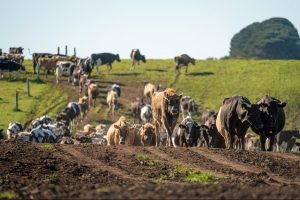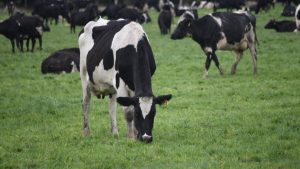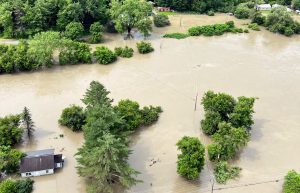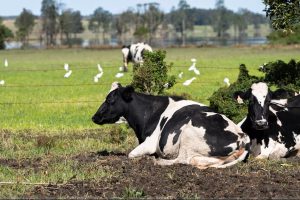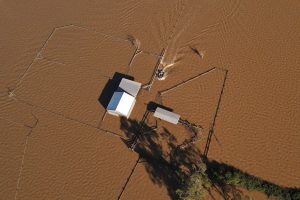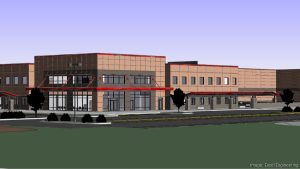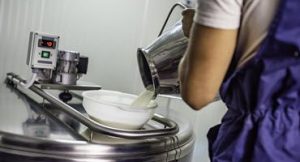
TO achieve the proposed reduction of 25% in agriculture emissions, West Cork farmers now believe they are facing a cull of the national herd, and that’s not going down too well.
Announcing that the agriculture sector will require the 25% cut by 2030, Minister for Agriculture Charlie McConalogue said the 25% plan was ‘a way of offering certainty to our farm families and their businesses over the next decade’.
However, for Barryroe-based dairy farmer and Munster IFA chair Harold Kingston, the Minister’s statement offers no such certainty to farmers or their families.
‘There is no real certainty in this plan. We would have struggled to get to a 22% reduction but to reach 25% this will mean a cull of animals and how can this prospect bring anything but concern to farmers and their futures?’ Harold Kingston asked.
‘The devil is in the lack of detail – where are the plans to support farmers with other sustainable income sources? There are an awful lot of questions that need to be answered with practical, viable and realistic solutions, not just for farmers, but for all of rural Ireland.’
These concerns have also been echoed by IFA president Tim Cullinan who sees the government’s plans as a potentially devastating blow for Irish farming and the rural economy.
‘The government has agreed to a target without any pathway to get there, or any budget to assist farmers to reduce emissions,’ Mr Cullinan said.
They have no idea of the economic and social impact of this decision on the farming sector or rural Ireland, he believes. ‘Farmers across the country will be rightly worried about what this means for their future,’ he said.
Macra na Feirme president John Keane feels that ‘farmer bashing’ from certain sections of the environmentalal lobby will do nothing to deliver results in lowering emissions from agriculture.
‘There is a pathway forward, based in sound science and with solutions that are practical to implement on farms across the country. Young farmers are delivering emissions reductions on farm for many years, measures that include improved breeding, reduction in fertiliser application and improved grass utilisation on farms,’ Mr Keane said.
Carbery Group chief executive Jason Hawkins said he can also see challenges ahead for the agri sector when it comes to reducing emissions by 25%.
‘Firstly, I want to make it clear that while we have been waiting for these climate targets to be agreed, that does not mean that we are starting our sustainability journey from now. Irish dairy farmers, and particularly Carbery suppliers, have been focusing on sustainable farming for a decade or more,’ Jason Hawkins told The Southern Star.
‘That being said, even with this longstanding commitment to sustainable farming, 25% is an extremely ambitious target to achieve, while ensuring we can maintain dairy farming as economically viable and sustainable into the future.’
‘Therefore, the detail in terms of the supports that will be offered to support this transition will be crucial, and needs to be tangible,’ he added.
The agreement has left many farmers deeply worried and is leading to extreme concern in rural Ireland, said West Cork Independent TD Michael Collins.
‘Common sense is telling me that there will be a cull. This is a full-frontal attack on the rural way of life by this government, dressed up in glossy climate change lingo and without any consultation. It is callous and cruel,’ Deputy Collins said.
He described the government’s decision as ‘a real kick in the teeth’, adding: ‘This government is hellbent on clinging to power rather than helping rural communities.’
‘Irish farmers, who are among the most carbon efficient food producers in the world, will be, despite the spin, hit extremely hard by this decision, as they have much less scope to lower emissions without drastically compromising food production and reducing the national herd.’
He noted the 6.5m cattle in Ireland, kept on more than 100,000 farms, all represent a crucial part of the agri-food sector.
‘The decision by the government to set a high legal emission reduction figure over the next eight years will, as we have consistently warned, lead to a cull of the national cattle herd at a time when other countries are drastically increasing herd sizes. For instance, Brazil plans to increase its national herd by 24m cattle – or four times the size of Ireland’s total herd – by 2030,’ the Goleen deputy said.
‘Given that Irish agriculture exports over 80% of produce, why was such a deal not sought by our government to protect our indigenous sector? Was it even considered?’ he wondered.
And he added that elsewhere, the emission cuts for Irish farmers are much deeper than in many other countries that have a heavy industrial base, such as the UK, Germany, France, and Italy. ‘That is because their agriculture emissions are disproportionately lower as a percentage of overall emissions. However, this has been ignored by our government.’
The Social Democrats’ agriculture spokesperson, West Cork TD Holly Cairns said that farmers and rural communities are rightly concerned at the lack detail put forward by the government to support the reduction in agriculture emissions.
‘The government’s emissions reduction plan must assist all farmers – not just the big players,’ Holly Cairns said.
The government’s climate action plans must support small family farms in West Cork using a just transition approach, she said.
‘The Minister should already have a consultation campaign in place to work with all stakeholders, not just major lobby groups. I am encouraging him to come down to West Cork and meet with people on the ground to develop practical approaches to reaching the targets.’
One such solution for farmers may be the embracing of more technologies, such as the use of alternative energy sources like anaerobic digestion.
Last month FF TD Christopher O’Sullivan drafted a bill to allow for the State to come up with a national strategy for recycling organic waste and turning it into biogas.
Anaerobic digestion (AD) is a process of recycling organic waste matter into a biogas, which can then be used for energy production and as an organic fertiliser, thus reducing emissions and generating low carbon renewable energy.
‘By positively contributing to the decarbonisation of Irish agriculture and the generation of renewable energy by the use of anaerobic digestion (AD), Irish farmers will be enabled to play a key role in slowing down the pace of climate change,’ said Deputy O’Sullivan.
An existing medium scale anaerobic digester in Timoleague produces enough electricity to power 1,000 homes, Deputy O’Sullivan said.
‘It’s estimated that over a 10-year period it will have stopped an estimated one million tonnes of carbon from escaping into the atmosphere,’ he said.
Germany has approximately 10,000 ADs. In the Republic of Ireland there are just 13.
There are other ways science can help, too.
Researchers at Teagasc are investigating whether the addition of native seaweeds and seaweed extracts to the ruminant diet can reduce methane emissions in cattle and other animals.
Seaweed is a renewable, natural resource found in all of our coastal climatic zones. It is naturally rich in protein (as much as 47% of the dry weight) as well as other bioactive compounds, such as polyphenols, phlorotannins, saponins, alkaloids, fibre and peptides. Seasolutions is a multinational, EU-Canadian collaborative project, led by Dr Maria Hayes at the Teagasc Food Research Centre in Ashtown in Dublin.
The project is investigating whether seaweeds that are abundantly found around the Irish coast can be used as feed additive ingredients for sheep, beef cattle and dairy cows.
Researchers Prof David Kenny, Sinéad Waters, Stuart Kirwan and Emily Roskam are using ingredients supplied by Teagasc Ashtown in feed formulations to assess the reduction in methane emissions in beef cattle and sheep.
‘Our ultimate objective is to identify specific bioactives within seaweed that could be harnessed as potent and reliable methane-suppressing dietary supplements,’ said Prof Kenny.
‘These need to be tested in a holistic fashion prior to potentially seeking legislative approval for their inclusion in animal feed. A critical aspect of this project is to test such supplements with the context of a pasture-based production system, which underpins the Irish beef and dairy industry, as opposed to relying on data generated from higher input, grain-based international studies.’
Meanwhile, in Bantry, another team is growing seaweed for the same potential use.
Dr Julie Maguire and her team at the Bantry Marine Research Centre have successfully grown a seaweed that, when added to feed, reduces the methane emissions produced by cattle.
With the support of BIM, her team set about screening seaweeds in different locations to check their suitability some years ago.
‘The plan is to produce an additive that when combined with silage or dry feed will reduce the methane emissions from cattle by up to 99%, a figure that would go a long way towards reaching the country’s carbon footpath obligations,’ she told The Southern Star.
‘There is great potential in working with seaweed. We have 600 species of seaweed around the coast and we don’t know what half of them are capable of, so there is a lot more work to do.’





